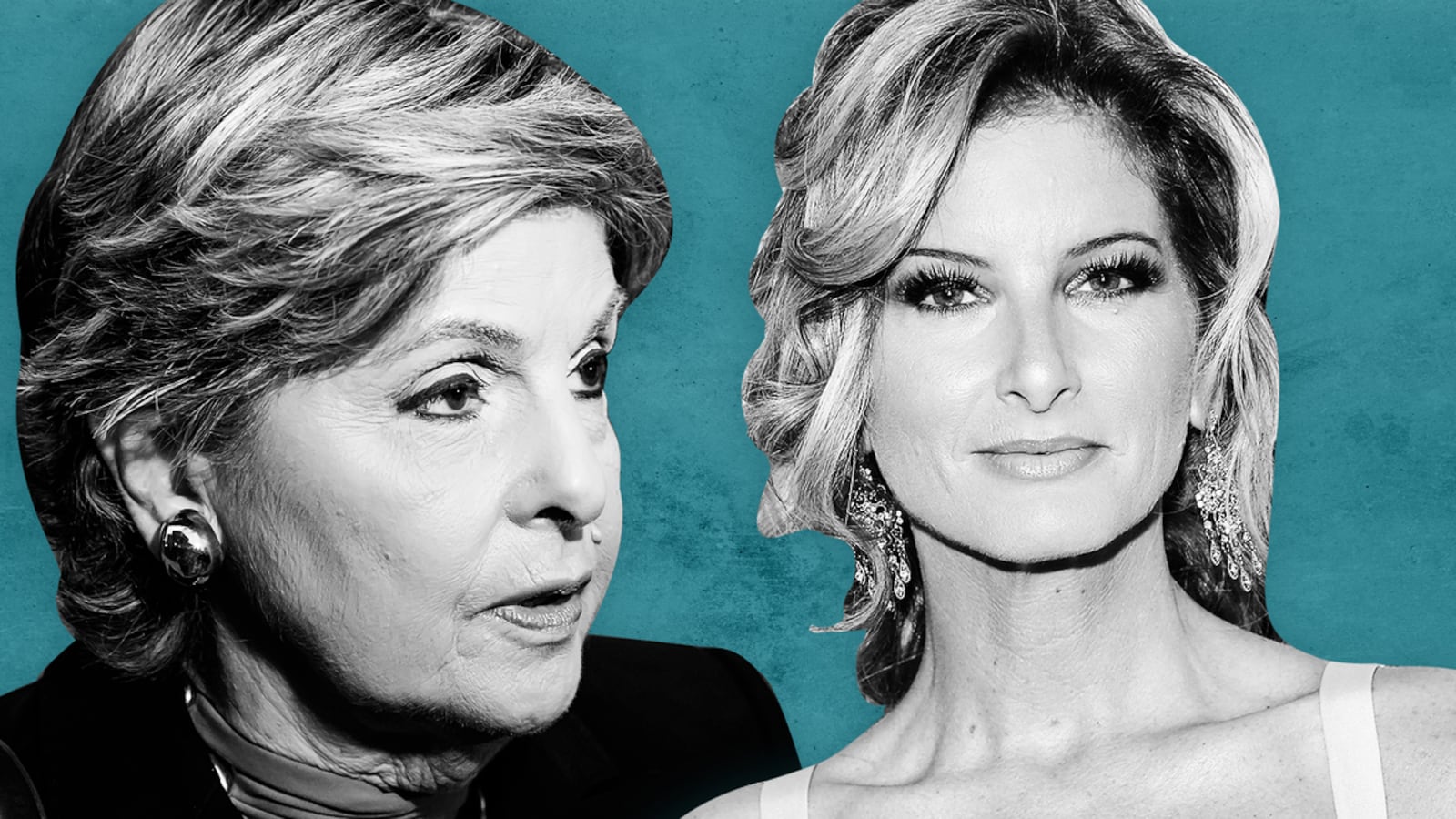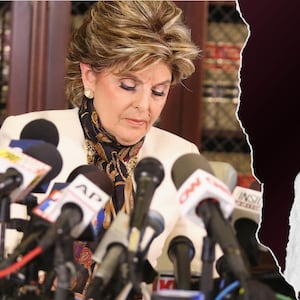When Summer Zervos went public with sexual harassment allegations against Donald Trump in 2016, there was a familiar face at her side: pioneering women’s rights attorney Gloria Allred. Months later, the two announced the filing of a defamation lawsuit against the president, who had called his accusers “liars” looking for “10 minutes of fame.”
The suit recently got the go-ahead from a New York appeals court, giving new hope to a raft of Trump accusers. But Zervos and Allred didn’t celebrate the victory together.
The former Apprentice contestant had split with her high-profile lawyer, and in recent months quietly filed a complaint against her with the state bar. Now she is going public with her grievances against Allred.
Zervos told The Daily Beast that Allred chastised her in phone calls and belittled her in emails. And she says the attorney refused to disclose a phone call they had in 2011 about her allegations—a conversation Zervos says proves her accusations were not politically motivated.
“I realize speaking publicly about Gloria Allred could make my case against Mr. Trump more difficult,” she said. “But I can’t sit and watch her take on more victims and not say anything.”
Allred called Zervos’ allegations “false,” but said she was unable to comment further because of her ethical obligations to her former client.
“I have been a lawyer for 43 years, and my law firm and I are proud that we have always maintained the highest ethical standards and we will continue to do so for the remainder of our careers,” she said in an email.
At their first press conference together, in October of 2016, Zervos sat next to Allred at a table covered in microphones, looking doe-eyed and shaken. Through tears, she told reporters that Trump had aggressively kissed her twice in 2007—at one point grabbing her breast and grinding his genitals into her at what was supposed to be a business meeting. She said the experiences—which Trump denies—had caused her “a great deal of pain and anguish.”
Allred painted Zervos as one of many victims who felt compelled to come forward after Trump announced his presidential bid. The now-infamous Access Hollywood tape had just been released, and Allred said Zervos decided to speak out after “hearing Mr Trump’s words on that tape.”
“At or near the time of what she alleges was Mr. Trump's sexual misconduct towards her, she did share with two people close to her what she experienced with Mr. Trump,” Allred said at the press conference. “But she told nobody else.”
But Zervos says she had told somebody else: Allred herself. In 2011, Zervos had become anxious that the media would get wind of her story. She reached out to a friend, who approached Allred’s daughter, lawyer Lisa Bloom, for legal help. Bloom then contacted Allred, who agreed to a phone call with Zervos and her friend.
Zervos says her friend reached out to Allred to prep her for the call. Documents reviewed by The Daily Beast show Allred, her co-worker Nathan Goldberg, and Zervos’ friend exchanging several communications about “potential legal representation” for “S. Zervos” in October 2011.
When Zervos eventually connected with Allred on the phone, however, the call did not go well. Zervos says she pushed back when her friend described Trump as a “maniac,” and told Allred she wasn’t interested in filing a lawsuit. Allred, she says, scolded her for wasting her time.
But everything changed when Trump ran for president. Instead of asking her if Trump’s hair was real, Zervos says people started asking whether he had ever sexually harassed her. With outlets like The New York Times covering Trump’s history with women, Zervos became convinced her encounters with him would eventually come out. So she returned to the famed attorney who already knew her story.
According to Zervos, the second meeting with Allred did not go much better than the first. She says Allred made her feel like “a dime a dozen” and insinuated that Trump wouldn’t even remember her. And even though Zervos preferred to talk to a print news outlet, she says, Allred repeatedly pressured her to do a press conference.
Allred denied pressuring Zervos into doing a press conference and said her client would have pre-approved any statement she read at the event.
“I have represented thousands of clients in my career and take pride in the fact that I pay individual attention to each of my clients whose cases I am handling,” she said in an email. “I treat each of my clients with respect and provide advice to my clients with a view to protecting them, their legal claims, and their legal rights.”
In addition, Zervos says she desperately wanted Allred to reveal that they had met years earlier. She thought this information would prove she was not a political operative or fame-seeker—allegations Trump and his supporters have levelled against his accusers.
“I think that people wonder why you took issue in the 11th hour with [Trump’s behavior],” Zervos told The Daily Beast. “And had it been known that I came forward in 2011, it would have shown it was something that caused me angst for a long time. It would show it was not a politically motivated situation. And it would show I was not looking to make a quick buck.”
But no matter how many times she asked, she says, Allred refused to discuss their 2011 visit publicly. She says the attorney gave her a rotating list of reasons for this, at times suggesting it would make her case look worse and at others insisting the judge wouldn’t like it.
In October of 2017, a year after Zervos’ press conference, The New York Times revealed that Bloom, Allred’s daughter, had been working with disgraced movie producer Harvey Weinstein to help him fend off allegations of sexual assault. The newspaper would later reveal that Allred had also brokered a number of confidential settlements with Weinstein’s accusers. (Allred has since defended the practice of securing private settlements, arguing that some victims may prefer not to go through the grueling process of a civil trial.)
The revelations shocked many people who saw Allred and Bloom as crusaders for women’s rights. Allred has represented women in some of the most infamous sexual assault and harassment cases, from Bill Cosby to Jeffrey Epstein, and also represents a number of other Trump accusers. When it was first revealed that her daughter had worked with Weinstein, Allred put out a pointed statement saying she only worked with victims of harassment, not the accused.
At the time, Zervos emailed Allred to express her frustration.
“It is unfair that this situation makes me appear less credible while simultaneously adding fear and lack of trust to victims and future victims of powerful men,” she wrote in an Oct. 7, 2017, email reviewed by The Daily Beast. “I try to walk a day in other people's shoes but I do not understand.”
“I do not understand,” Allred responded to Zervos. “Are you a victim of Harvey Weinstein?”
Five months later, Zervos fired Allred. Both women issued brief statements, with Allred saying the split had nothing to do with the merits of Zervos’ case, and Zervos saying it had nothing to do with Allred’s work as her attorney. The remaining attorney on the case, Mariann Wang, thanked Allred’s firm for "all their work on this important case.”
But one year later, Zervos filed a bar complaint against her former lawyer, claiming Allred had continued to discuss her case in the press. When she was a client of Allred's, Zervos wrote, the attorney had made inaccurate statements about her case and warned her “how much worse things would get” if she tried to leave the firm. The attorney, she continued, was an “unethical opportunist who repeatedly goes against clients’ written wishes and agreements.”
“Gloria knows my case with Mr. Trump is very important to me and I am scared to rock the boat in any way,” she continued. “With this she repeatedly violates me knowing I do not have an outlet.”
Allred says she responded to each of Zervos’ allegations in writing to the state bar. In September, the organization notified her it had completed its investigation and concluded that Zervos’ complaint “does not warrant further action," meaning she had not violated any rules of professional conduct.
Allred said she could not comment on the specific allegations without Zervos’ written consent.
“The allegations, even if untrue, involve communications between lawyer and client,” she said. “We responded to her complaint directly to the State Bar which made its decision to close the file because their investigation showed that there was no basis for taking any action.”
Zervos says she plans to refile her complaint against Allred within the next three months. She is also still pursuing her defamation case against Trump, which Allred and Wang filed in 2017. In Allred’s absence, Wang is now the lead attorney on the case, which asks for Trump to retract or apologize for his statements, as well as paying damages.
Trump’s attorneys have attempted to have the case thrown out, claiming a sitting president cannot be sued in state court. But a New York appeals court ruled in March that the case could proceed on matters unrelated to his conduct in office.
In a statement after the appeals court decision, Wang said the court had affirmed that the president is “not above the law,” adding, “We look forward to proving to a jury that Ms. Zervos told the truth.”










